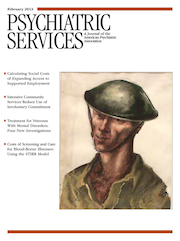To the Editor: Chinese Americans represent one of the fastest-growing ethnic groups in the United States. In Chinese culture interdependence is highly valued, and patients with schizophrenia have reported experiencing discrimination from family members, friends, and colleagues as a result of their stigmatizing beliefs (
1). When Chinese-American immigrants are prescribed psychotropic medications, most stop taking the medications prematurely, which leads to poor outcomes (
2). Furthermore, studies have shown that about half of Chinese Americans (46%) do not speak English at home and may have limited access to health information from mainstream media (
3). A previous study in China supported the utility of including health content in Chinese newspapers (
4). Targeting Chinese-American immigrants by using Chinese-language mass media may help increase mental health literacy.
To address this issue, I partnered with World Journal, a daily Chinese-language newspaper that has more Chinese-American readers (350,000 daily) than any other such newspaper. In 2010–2011, I wrote four articles for the newspaper to raise awareness and provide an accurate description of psychosis for Chinese-American immigrants. Because I was unable to determine the number of readers of the print articles, I ascertained the number who used the direct link to each online article (count obtained on June 22, 2012) as a proxy measurement of the usefulness of this method of promoting psychosis literacy.
In the September 19, 2010, article, “Prevention Begins With Recognition of Psychosis,” I described the case of a man who visited an emergency room with new-onset psychosis. I also discussed how psychiatric symptoms may disguise the presence of a general medical disorder. This article was viewed 129 times.
In the October 17, 2010, article, “Substance-Induced Psychosis,” I first presented information on California Proposition 19 regarding medical marijuana and then described a case of substance-induced psychosis that resolved rapidly. Finally, I presented data on emergency department visits for drug-related issues. This article was viewed 2,743 times, with seven reader comments to the editor.
In the July 31, 2011, article, “A Musician Who Developed Schizophrenia,” I wrote about the movie The Soloist. Because the protagonist has schizophrenia, I used the movie to describe signs of psychosis. The article was viewed 243 times.
In the August 14, 2011, article, “The Tragedy of Homelessness in Schizophrenia,” I reiterated that people with schizophrenia are not violent, and I encouraged readers that even if their loved one receives a diagnosis of schizophrenia, there is always hope. The article was viewed 448 times.
The four articles had a total of 3,563 views, although use of online views only may not reflect actual readership. The October 17, 2010, article accounted for 77% of the total views and was the only article with reader comments. Beginning the article by focusing on a current event may have attracted readers, and use of a case example helped make psychotic illness real.
Newspaper articles and other mass media can draw the public's attention to psychosis, a debilitating illness that affects all aspects of a person's life. Improving mental health literacy about psychosis can decrease stigma and discrimination for Chinese Americans with psychotic illnesses.
Acknowledgments and disclosures
The author reports no competing interests.

